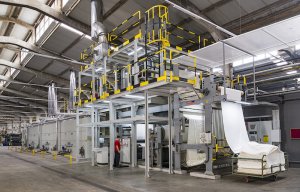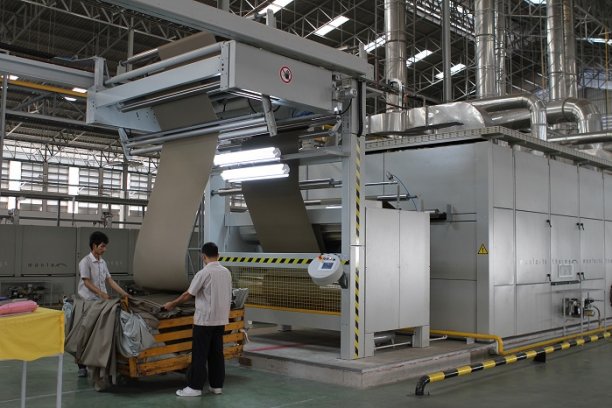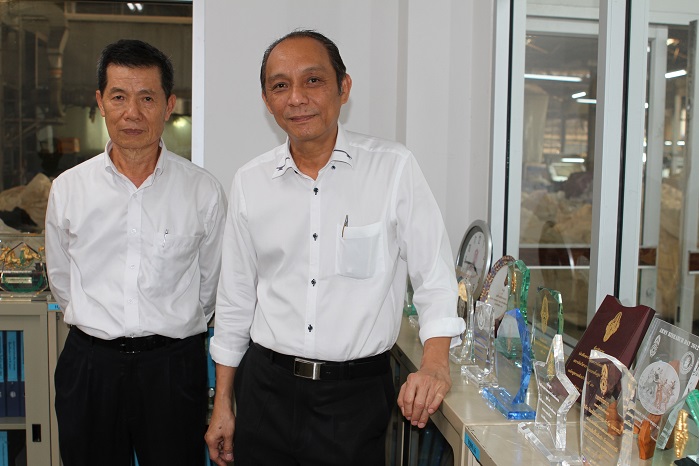
Advanced Monforts automation is the key for Hamle
According to Chai Her Ching, TTP Assistant Director, one of the reasons for selecting the Thermex 6500 is the balance of the rollers and the temperature evenness.

1st June 2015
Innovation in Textiles
|
Moenchengladbach
Thailand’s largest vertical textiles producer, Thai Textile Printing (TTP), has added a Monforts Thermex 6500 continuous dyeing machine to its production line-up, enabling the company to increase production and add new fabrics to its range.
Thai Textile Printing was founded in 1973 and is located in the textile production district of Samut Prakarn, a province neighbouring Bangkok. Undertaking bleaching, dyeing, printing and finishing of fabrics, the company employs more than 500 people at its 110,984 square metre facility.
The company installed its first Monforts unit, a sanforiser, in 1987. The machine is still operating today as an integral part of the production line. “Installing the first machine allowed us to develop our range of textiles,” explained Chai Her Ching, TTP Assistant Director. “As we are pursuing a policy of quality production and environmental responsibility, we have subsequently invested in several other Monforts units.”
TTP installed a Montex 5000 stenter in 2002, a machine that is also still in full production mode. In 2012 a second Montex and Thermex were added to the line-up.
The company produces between 7 and 8 million metres of textiles per month, and the new Thermex 6500 will help the company increase production by a further 1.5 million metres.
The weight of the fabric passing through the machine will range from 140 to 240 g/m², although the company handles light fabrics ranging between 85 and 130 g/m², and heavier fabrics from 250 to 400 g/m².
According to Chai Her Ching, one of the reasons for selecting the Thermex 6500 is the balance of the rollers and the temperature evenness. “We know from experience that the fabric will pass smoothly and evenly through the machine, and given the long runs and the tight schedules we have, this is important for our reputation for quality and reliability,” he said.
The Thermex hotflue is equipped with indirect gas heating and features the Econtrol process, which is said to enable dyeing time to be completed in a matter of a few minutes.
The environmental and energy saving systems built into the Thermex help TTP to comply with its own internal policies and Thailand’s environmental laws. TTP gained its first ISO 9002 certification in 2000 and upgraded to ISO 9001 version 2008 in mid 2009. The company has had ISO 14001 certification since 2002.

The company uses a wastewater treatment system that can support 5,500 m³/day of effluent, with an efficiency of 90-98 % before being discharged into the environment.
TTP is the country’s largest producer of cotton textiles for the Thai military, producing uniform fabrics in various camouflage patterns for the Royal Thai Army, Navy and Air Force with anti-mosquito protection. The company also produces fabric for other uniforms including the fire service with fire-resistant materials being a speciality.
About 70 % of production is for overseas customers, with the remaining 30 % going to the domestic market. The service extends to the finishing of piece-dyed and yarn-dyed fabrics to customer specifications.
Most of the fabric handled for continuous dyeing by TTP is 100 % cotton, texture polyester/cotton, cotton/nylon blends and synthetic fibre such as polyester and nylon. The printing side of production produces pigment print, and reactive, cosmo, disperse/vat, wet-on-wet resist, and pad-dry resist print.

Business intelligence for the fibre, textiles and apparel industries: technologies, innovations, markets, investments, trade policy, sourcing, strategy...
Find out more